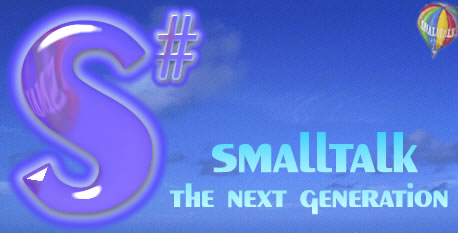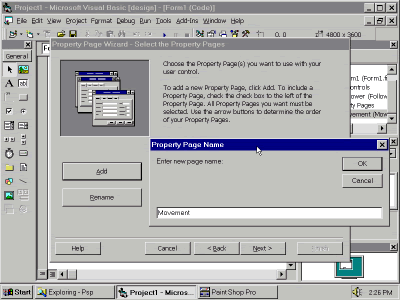Seventy recipes for cooking Ruby On Rails applications...
Tuesday 26 September 2006
Now’s the time to make your movie and write your book...
Thursday 14 September 2006
The record, TV, movie, magazines and book publishing companies have every reason to be worried. In the past it was difficult and, often, cripplingly expensive, for aspiring singers, actors or writers to get themselves onto vinyl (or whatever CDs are now made of), celluloid, video tape or the printed page.
Follow our quick-start guide to developing applications with Delphi
Tuesday 5 September 2006
With the release of free versions of the Borland language products, there has never been a better time to learn to program in Delphi.
First steps in Delphi coding…
Tuesday 5 September 2006
If you are new to Delphi, you make want to start off by reading our Introduction To The Delphi IDE. This will guide you through your first twenty minutes with Delphi and it introduces you to the fundamentals of Delphi programming. Once you’ve read that, come back to this feature to delve a little more deeply into Delphi’s Object Pascal language…

Check out the Bitwise Delphi features for coders of all levels…
Tuesday 5 September 2006
Delphi is a powerful programming system with an excellent, tightly integrated development environment that gives you a large toolset for designing a user interface, editing code and debugging the application. Now the Borland Developer Tools Group has released free versions of Delphi called Turbo Delphi Explorer (download from http://www.turboexplorer.com/). These come in two versions – one for .NET development and another for Win32. There are also editions of Turbo Explorer for C++ (Win32) and C# (.NET).
Is this the future of broadcasting…?
Thursday 31 August 2006

Just like blogging, it started out with something of a ‘computer geek’ image and then rapidly became mainstream. So mainstream, in fact, that even established broadcasting companies such as the BBC, CNN and ABC News now provide programmes in the form of podcasts.
a blogging platform for podcasters...
Thursday 31 August 2006

If you want to attach a podcast to a regular blog, it makes sense to choose a blogging package with podcasting features ‘built in’ – such as, for example, LifeType. Here Oscar Renalias, lead developer of LifeType, gives bitwise an inside view on what makes a great podcasting platform…
Dermot Hogan gets all fired up with a Visual Basic control
Monday 28 August 2006
Last month, I showed how to build a control that could move itself. Normally, this behaviour is not very desirable and, if a data entry control started to wander about over a form, you might well want to ask the programmer for an explanation. Either that or lay off the hard stuff yourself.
A free service to syndicate your podcast...
Sunday 27 August 2006
One of the simplest ways of turning your Blog into a podcast is by using FeedBurner – a free service that sucks in an RSS feed and spits it out in a ‘podcastable’ format. But how does it work and why shouldn’t you just let your Blog software create its own podcast feed? These are just a couple of the questions we put to FeedBurner’s Rick Klau…
Blogging in sound...
Monday 21 August 2006

- Can Loudblog do for podcasting what WordPress does for blogging...?
If you want to publish your podcast, maybe you should think of using a dedicated podcast publishing package? Yes, such a thing really does exist. It’s called Loudblog, it’s written in PHP – and it’s free. Here Huw Collingbourne talks to Loudblog’s developer, Gerrit van Aaken…
Internet Business
Podcasting for pleasure and profit…?
Friday 18 August 2006

- ChinesePod - free podcasts with ’paid for extras’. Is this the secret of making a successful business from podcasting?
It only seems like yesterday that Blog-fever was sweeping the Internet. But already a Blog without audio is starting to seem quaintly old-fashioned. These days, if you want to make an impression on the web you really need a podcast. Many podcasts are purely amateur affairs, little more than ‘audio diaries’. Some podcasts, however, have higher ambitions. One such is ChinesePod – a professionally produced podcast and Bitwise Recommended Award Winner, made by an International team in Shanghai, China. To get an idea of what it takes to make a successful business out of podcasting, Huw Collingbourne spoke to ChinesePod’s co-founder, Hank Horkoff…
...view from a Smalltalker
Saturday 12 August 2006
As you may know, when it comes to ‘programming methodologies’ I tend to be something of sceptic (see Programming, Methodologies and Buzzwords). I was interested, therefore, to read Vassili Bykov’s critique of ’extreme programming’ (XP) on his Cincom Smalltalk Blog. This is all the more interesting since XP is often associated with the Smalltalk language. Just like me, Vassili is rather keen on documentation (something to which ‘Extreme’ and ‘agile’ programmers pay scant attention).
...and this time it’s free!
Friday 11 August 2006
I remember, at a Borland conference in San Francisco, some time in the mid 90s, listening to the company’s boss, Philippe Kahn, waxing lyrical about object orientation while the software’s chief architect, Anders, Hejlsberg, admitted that he had been extremely reluctant to add all those ‘nasty objects’ to his lovely elegant Pascal.
New product from RemObjects
Helping Delphi developers to mix managed and unmanaged code...
Friday 11 August 2006
Delphi developers should soon be able to bridge the gap between Win32 and .NET thanks to a new product from RemObjects. Currently under development, Hydra 3 will provide a way of creating hybrid applications which combine elements using both managed and unmanaged code.
...in which Wilf plays his cards right, has a Eureka! moment and creates the next big craze.
Monday 7 August 2006

- Sitting in the bath one day, Wilf (just like Archimedes) has a stunning insight...
Mathematical games often have a delightful compulsion to them: think back a few decades to the Rubik cube, which gradually swept much of the world’s population under its power. In other times we have seen the “Fifteen-Sixteen” puzzle – a square divided into fifteen squares (and one missing gap) where you could slide an adjacent square into the gap, leaving the gap behind it.
Book Review
Friday 4 August 2006
We talk to David Simmons, developer of S#, about Smalltalk, Ruby, .NET and dynamic languages on the web…
Tuesday 1 August 2006
 S# (‘S-Sharp’) is a superset/dialect of classic Smalltalk-98 which offers transparent cross-language integration and component based deployment. With a new version of S# on the horizon, we decided it was time to get the inside info from the man at the top...
S# (‘S-Sharp’) is a superset/dialect of classic Smalltalk-98 which offers transparent cross-language integration and component based deployment. With a new version of S# on the horizon, we decided it was time to get the inside info from the man at the top...
...is intellectual property just patent nonsense?
Monday 31 July 2006
There’s a saying in the music industry: “where there’s a hit there’s a writ”. Meaning, if you have a nice tune and make some nice money from it, someone, somewhere will try to get a slice. The usual claim in the music industry is that the whole or part of the tune was ‘borrowed’ from an existing piece of music, which, naturally, the party to the writ claims to have written, so to speak.
Yes, there really is one. Or, anyway, there used to be…
Thursday 27 July 2006
Way back in the 1980s, Microsoft embarked upon a Ruby project. This was to be a user-friendly programming language which even had its own point-and-click visual-programming user interface.
From Encapsulation to Extender Objects…
Dermot Hogan finds poetry in motion as Visual Basic 6 controls follow him around.
Thursday 27 July 2006
One of the more useful ideas in programming is ‘data hiding’. Fundamentally, you put information inside an object so that it can’t be modified or even seen from programs external to the object. This is taken to its extreme in Smalltalk, but even in a humble Visual Basic 6 program, it finds its uses.

More..
|
|
|
|
|
|
|
|
|
420
|